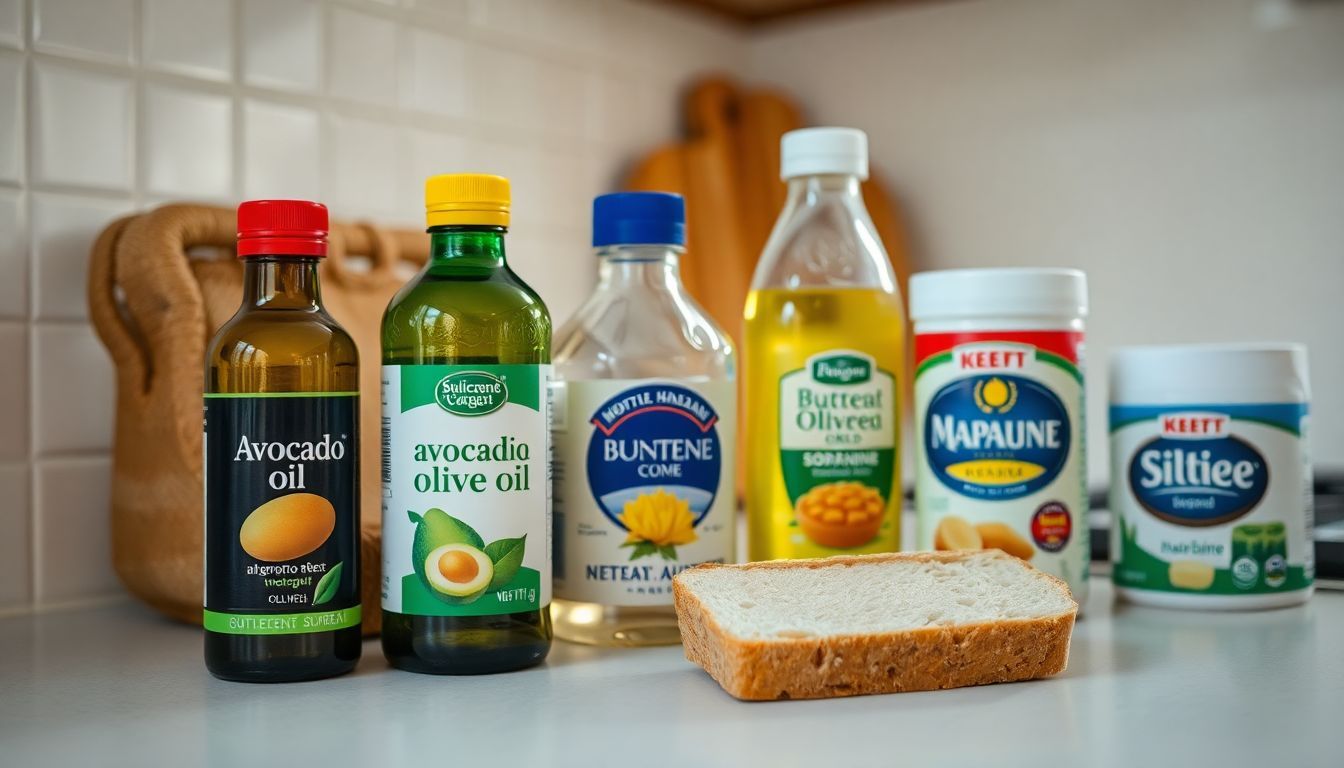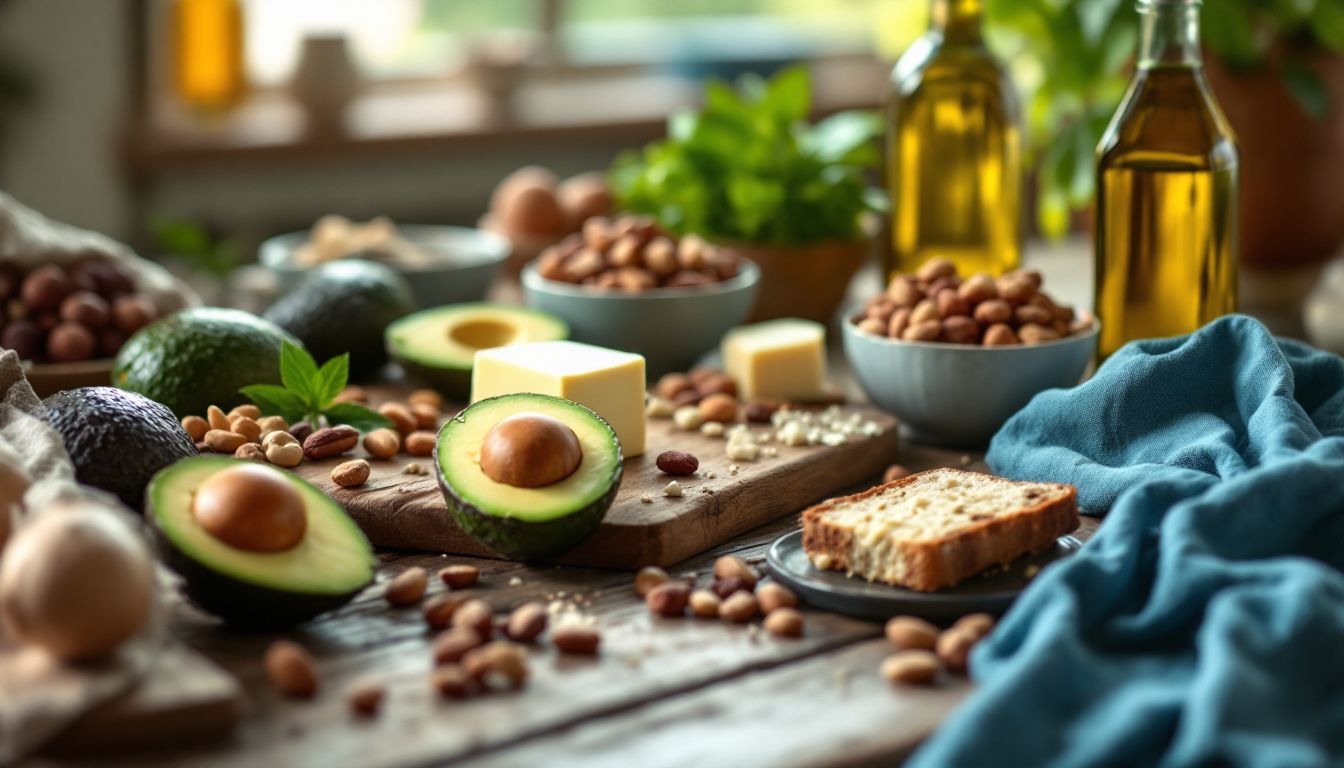Many people worry about how butter affects their heart health. Butter is high in saturated fat, which can raise “bad” LDL cholesterol levels and lead to heart problems. Thankfully, there are healthier butter alternatives that taste great and support better health.
Thank you for reading this post, don't forget to subscribe!Keep reading to find the best options for your heart!
Key Takeaways
- Butter is high in saturated fats, with 7 grams per tablespoon. Eating too much can raise LDL cholesterol and increase heart disease risk.
- The American Heart Association (AHA) advises limiting saturated fat to less than 6% of daily calories (11-13 grams on a 2,000-calorie diet).
- Healthier alternatives include olive oil, avocado, nut butters, Greek yogurt, and pureed beans. These provide good fats and essential nutrients like vitamins and fiber.
- Use mashed avocado or applesauce for baking; replace spreads with nut butter or plant-based oils to reduce bad cholesterol.
- Switching to unsaturated fats found in olive oil or vegetable oils helps lower the risk of heart problems while supporting overall health.
Why Consider Butter Alternatives for Heart Health

Butter is packed with saturated fats. Just one tablespoon contains over 7 grams, which can raise LDL cholesterol—often called “bad cholesterol.” High levels of this in your blood lead to a higher risk of heart disease.
The American Heart Association (AHA) advises keeping saturated fat to less than 6% of your daily calories. On a 2,000-calorie diet, that’s only about 11-13 grams, and two tablespoons of butter already push you past the limit.
Swapping butter for alternatives brings big benefits. Unsaturated fats found in plant oils like olive oil or avocado oil help lower bad cholesterol while boosting heart health. Polyunsaturated fats from soybean oil also reduce the risk of cardiovascular disease.
Everyday spreads like margarines made from unsaturated oils offer healthier choices compared to traditional butter loaded with trans and partially hydrogenated oils. Find out why these swaps matter as we explore top options next!
Top Heart-Healthy Butter Alternatives in 2023
Heart-friendly butter substitutes can make a big difference in your diet. Here’s a quick guide to some of the best options available today:
| Alternative | Nutritional Benefits | Usage Tips |
|---|---|---|
| Nut and Seed Butters (e.g., Almond, Sunflower) | Rich in heart-healthy fats, fiber, and protein. Packed with vitamins and minerals. | Spread on toast, mix into smoothie bowls, or use in baking recipes. |
| Avocado | Loaded with nearly 20 vitamins, minerals, and heart-healthy fats. A great source of potassium. | Mash as a spread, blend into sauces, or use as a butter replacement (1:1 ratio). |
| Olive Oil | High in monounsaturated fats and antioxidants. Supports heart and brain health. | Drizzle on bread, sauté vegetables, or bake in place of butter (1:1 ratio). |
| Greek Yogurt | Provides 15 grams of protein per cup. Creamy texture with fewer calories than butter. | Perfect for baking, creamy sauces, or as a topping for potatoes and toast. |
| Pumpkin Puree | 7 grams of fiber per cup with potassium, Vitamin A, and cancer-fighting carotenoids. | Use in muffins, cookies, or as a natural thickener in soups and sauces. |
| Pureed Beans (e.g., White Beans) | 299 calories, 19 grams of protein, and 13 grams of fiber per cup. Low-fat and nutrient-rich. | Incorporate into baked goods or use to thicken soups and spreads. |
Each option brings unique vitamins, minerals, and uses to the table—literally.
Tips for Incorporating Butter Substitutes in Your Diet
Switching to butter substitutes can improve heart health and reduce bad cholesterol levels. Use these simple tips to make the change easier.
- Replace butter with mashed avocado in a 1:1 ratio for baking—it works well in chocolate recipes and adds healthy monounsaturated fats.
- Try unsweetened applesauce mixed with oil instead of butter in baked goods; this combo slashes calories and saturated fat while keeping flavor.
- Spread nut butters, such as almond or peanut butter, on toast instead of regular butter for added protein and omega-6 fatty acids.
- Use olive oil or avocado oil as a topping for vegetables or bread to skip the trans fats found in some buttery spreads.
- Substitute clarified butter (ghee) in cooking—it has less dairy but still gives a rich, nutty flavor.
- Choose plant-based butters made from seed oils or nuts—they’re lower in saturated fat compared to salted butter options.
- Add mashed bananas when baking muffins or pancakes; they provide moisture without the extra cholesterol from unsalted butter.
- Cook with canola oil or vegetable oils for frying or sautéing—these are good sources of polyunsaturated fats that help lower LDL cholesterol levels.
- Follow the American Heart Association’s advice and use fewer spreads high in partially hydrogenated oils to avoid harmful trans fats.
- Experiment with Mediterranean diet ideas by using Greek yogurt instead of spreadable butter for creamy sauces or dips.
Conclusion
Choosing heart-friendly butter alternatives can make a big difference in your health. Options like olive oil, avocado oil, and nut butters are tasty and better for your heart. They reduce bad cholesterol while adding good fats to your meals.
Make small swaps today for a healthier tomorrow—your heart will thank you!
References
- https://www.mayoclinic.org/healthy-lifestyle/nutrition-and-healthy-eating/expert-answers/butter-vs-margarine/faq-20058152
- https://pmc.ncbi.nlm.nih.gov/articles/PMC5480968/
- https://www.consumerreports.org/cro/2014/01/the-healthiest-spread-for-your-bread/index.htm
- https://january.ai/blog/healthiest-butter-to-eat-butter-substitute
- https://www.everydayhealth.com/news/healthy-alternatives-to-butter/ (2024-01-16)
- https://www.healthline.com/nutrition/best-butter-substitutes
